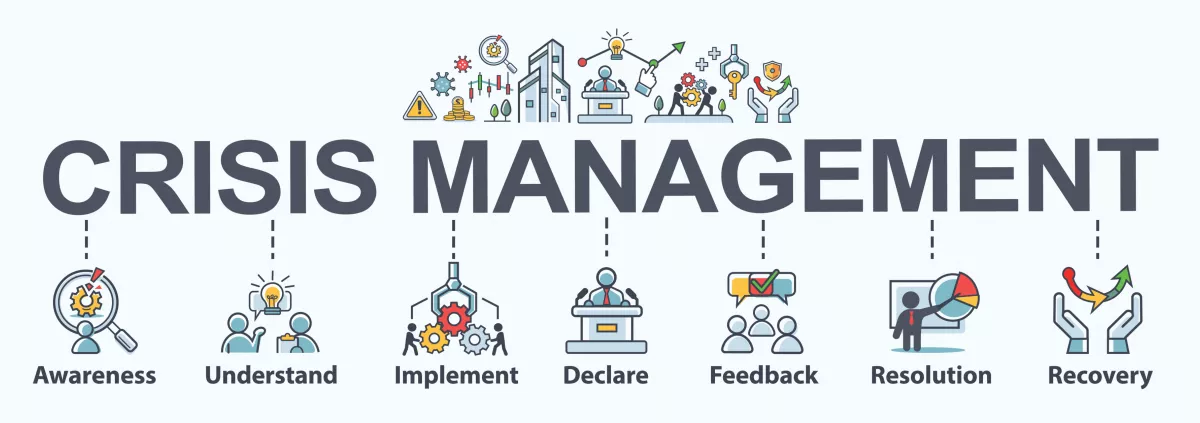The COVID-19 pandemic has presented unique challenges to the public sector worldwide. Especially municipalities play a central role in fighting the pandemic. Increasingly, municipalities are also developing local strategies for the recovery and conceptualising post-pandemic measures.
Due to the constant emergency situation in the Palestinian Territories, coupled with the negative impact of the Corona pandemic, crisis management planning especially at the municipal level is perceived as a high priority. Therefore, and as part of the Connective Cities programme, 10 Palestinian municipalities:
- Tullkaram,
- Salfit,
- Toubas,
- Al Beera,
- Beitunia,
- Jericho
- Halhoul,
- Beit Jala,
- Bani Naim,
- and Dura
have come together in 3 working groups to work out solutions for their common crisis management challenges . The working groups have worked throughout the past 3 months with the support of national experts on developing various prototypes, projects ideas as well as sharing their good practices in crisis management in different sectors (Education, Local Economy , and Health) with each other.
In this workshop, the working groups will present the results of their work and share their good practices so that other municipalities have the opportunity to benefit from their experience and also provide some feedback to help further developing the results.
The workshop will also be accompanied by two international crisis management experts who will provide feedback on the results and answer questions of the attending municipalities as follows:
1- Mr. Oliver-Patrick Rodewald - Chief of Johanniter Headquarters Berlin and Brandenburg who has extensive experience in international crisis & disaster response (e.g. Emergency Medical Teams (WHO) to areas of natural catastrophes & security assessments on insurgence, kidnappings and abductions).
2- Ms. Vera-Magdalena Voss , from Diakonie-katastrophenhilfe orgnaization who has extensively worked in the field of humanitarian assistance, covering emergency settings in Haiti, Syria, Iraq, Lebanon and Jordan.
Languages: Arabic , and English.
لقد مثل الوباء تحديات فريدة لهيئات الحكم المحلي . وتلعب البلديات على وجه الخصوص دورا محوريا في مكافحة انتشار الفيروس. وتقوم أيضا، وعلى نحو متزايد، بوضع استراتيجيات محلية لتدابير الإنعاش ما بعدالجائحة.
ونظرا للحالة الاستثنائية المستمرة التي تعيشها اراضي السلطة الفلسطينية الى جانب الاثار السلبية المترتبة لوباء كوفيد -19 اصبح هناك حاجة ملحة للعمل على تخطيط ادارة الازمات والطوارئ على مستوى هيئات الحكم المحلي للحد من تلك الاثار السلبية. لذلك ، وكجزء من برنامج المدن المتصلة ، اجتمعت 10 بلديات فلسطينية (طول الكرم , سلفيت, طوباس ,البيرة , بيتونيا , أريحا , حلحول , بيت جالا , بني نعيم و الدورا ) في 3 مجموعات عمل للتوصل إلى حلول للتحديات المشتركة لإدراة الأزمات.
عملت مجموعات العمل خلال الأشهر الثلاثة الماضية بدعم من الخبراء الوطنيين على تطوير نماذج أولية مختلفة ، وأفكار مشاريع بالإضافة إلى مشاركة ممارساتهم الجيدة في إدارة الأزمات في مختلف القطاعات (التعليم والاقتصاد المحلي والصحة) مع بعضهم البعض.
ستقوم مجموعات العمل خلال هذه الورشة بعرض نتائج عملها وتشارك ممارساتها الجيدة حتى تتاح للبلديات الأخرى الفرصة للاستفادة من تجربتها وأيضًا تقديم بعض التعليقات للمساعدة في تطوير النتائج بشكل أكبر.
كما سيصاحب ورشة العمل خبيرين دوليين في إدارة الأزمات سيقدمان الملاحظات على النتائج والإجابة على أسئلة البلديات المشاركة على النحو التالي:
1- السيد Oliver-Patrick Rodewald - رئيس مقر Johanniter في برلين وبراندنبورغ ولديه خبرة واسعة في الاستجابة للأزمات والكوارث الدولية (مثل فرق الطوارئ الطبية (WHO) لمناطق الكوارث الطبيعية والتقييمات الأمنية حول التمرد وعمليات الاختطاف).
2- السيدة Vera-Magdalena Voss ، التي عملت على نطاق واسع في مجال المساعدة الإنسانية ، حيث غطت حالات الطوارئ في هايتي وسوريا والعراق ولبنان والأردن.
لغة الورشة : اللغة الإنجليزية , اللغة العربية.
